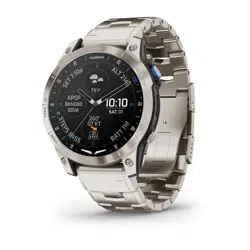Loading ...
Loading ...
Loading ...

Pulse Oximeter
Your watch has a wrist-based pulse oximeter to gauge the saturation of oxygen in your blood (SpO2). Knowing
your oxygen saturation can help you determine how your body is adjusting to high altitudes. As your altitude
increases, the level of oxygen in your blood can decrease. When you view the pulse oximeter glance while you
are not moving, your watch analyzes your oxygen saturation and your elevation. The elevation profile helps
indicate how your pulse oximeter readings are changing, relative to your to elevation. During a flight, the watch
automatically takes pulse oximeter readings more frequently, so you can monitor your SpO2 percentage
(Viewing Your SpO2 Readings in Flight, page 7).
You can manually begin a pulse oximeter reading by viewing the pulse oximeter glance (Getting Pulse Oximeter
Readings, page 75). You can also turn on all-day readings (Setting the Pulse Oximeter Mode, page 75). When
you remain motionless, your watch analyzes your oxygen saturation and your elevation. The elevation profile
helps indicate how your pulse oximeter readings are changing, relative to your to elevation.
On the watch, your pulse oximeter reading appears as an oxygen saturation percentage and color on the graph.
On your Garmin Connect account, you can view additional details about your pulse oximeter readings, including
trends over multiple days.
For more information about pulse oximeter accuracy, go to garmin.com/ataccuracy.
The elevation scale.
A graph of your average oxygen saturation readings for the last 24 hours.
Your most recent oxygen saturation reading.
The oxygen saturation percentage scale.
A graph of your elevation readings for the last 24 hours.
74 Sensors and Accessories
Loading ...
Loading ...
Loading ...
